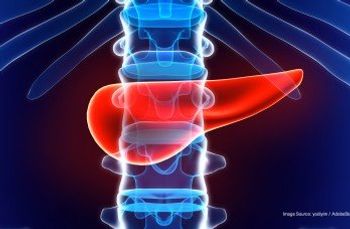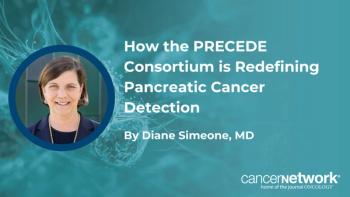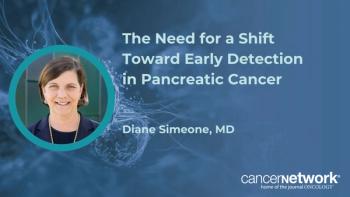
Oncology NEWS International
- Oncology NEWS International Vol 19 No 10
- Volume 19
- Issue 10
Adjuvant 5-FU/Folinic Acid and Gemcitabine Equally Effective in Pancreatic Cancer
In a large study of resected pancreatic cancer, overall survival did not differ whether patients received gemcitabine or 5-FU/folinic acid.
For patients with completely resected pancreatic cancer, adjuvant therapy with fluorouracil/folinic acid is as effective as gemcitabine, according to the largest randomized controlled trial to date of adjuvant therapy in this disease, conducted by the European Study Group for Pancreatic Cancer.
The group's previously reported ESPAC-1 study showed a survival advantage for adjuvant 5-FU/folinic acid, and in 2007, the Charite Onkologie Clinical Studies in GI Cancer CONKO-001 study established gemcitabine (Gemzar) as the standard of care for advanced pancreatic cancer. Building on these results, the ESPAC investigators initiated the ESPAC-3 trial to compare the two regimens.
The phase III study enrolled 1,088 resected pancreatic cancer patients at 159 centers in 17 countries from 2000 to 2007. Patients received either folinic acid 20 mg/m2 IV bolus followed by 5-FU 425 mg/m2 IV bolus given on five consecutive days every 28 days for six cycles, or IV gemcitabine 1,000 mg/m2 once weekly for three out of every four weeks for six cycles.
After a median follow-up of 34.2 months, overall survival did not differ between the two groups: 23.0 months with 5-FU/folinic acid and 23.6 months with gemcitabine (hazard ratio [HR] 0.94; P = .39), reported John P. Neoptolemos, MD, of the University of Liverpool and his ESPAC colleagues. Progression-free survival was14.1 months and 14.3 months, respectively (HR 0.98; P = .53) (JAMA 304:1073-1081, 2010).
Patients receiving gemcitabine had fewer treatment-related serious adverse events (52 vs 97 for those on 5-FU/folinic acid; P < .001). Grade 3-4 stomatitis and diarrhea were significantly increased in the 5-FU patients, whereas the gemcitabine patients had significantly increased grade 3-4 hematologic toxicity. Quality-of-life scores did not differ significantly between groups.
Prognostic factors
On multivariate analysis, significant independent prognostic factors for overall survival were disease grade, nodal status, tumor size, performance status, postoperative CA19-9 levels, and smoking status. Resection margin status was significant only on univariate analysis, "confirming the previous results of ESPAC-1 that primary tumor characteristics dominate outcome," the authors wrote.
The novel finding that tobacco smokers (past and present) had significantly shorter OS, compared with never smokers, "should add further weight against the use of tobacco," they noted.
VANTAGE POINT
New adjuvant therapy trials promise 'incremental' advances
EILEEN M. O'REILLY, MD
The ESPAC-3 trial results have firmly established the value of adjuvant chemotherapy in the treatment of resected pancreatic cancer, said Dr. O'Reilly, of Memorial Sloan-Kettering Cancer Center and Weill Medical College of Cornell University, both in New York City. Although gemcitabine remains the preferred treatment, the study validates an alternative approach with fluorouracil/folinic acid for patients unable to tolerate gemcitabine, she said in an accompanying JAMA editorial (304:1124-1125, 2010).
Dr. O'Reilly described several ongoing trials that should help refine the use of adjuvant therapy in pancreatic cancer. The ESPAC-4 trial, with a planned enrollment of more than 1,000 patients, is comparing combination chemotherapy with gemcitabine (Gemzar) plus capecitabine (Xeloda) against gemcitabine alone. Results should be available to five to seven years. The CONKO-005 study is evaluating gemcitabine plus erlotinib (Tarceva) vs gemcitabine alone in resected patients with negative margins.
The earlier ESPAC-1 trial found no survival advantage for adjuvant chemoradiotherapy, she said, although the results have been criticized due to the complex design and possible problems with radiotherapy quality control. In the international RTOG 0848 trial, patients with resected head of pancreas adenocarcinoma will first be randomized to five cycles of gemcitabine alone or with erlotinib. The second randomization, for nonprogressing patients, will be to one cycle of adjuvant chemotherapy alone (continuing the regimen the patient received in the first randomization) or followed by radiotherapy concurrent with either 5-FU or capecitabine.
Thus, Dr. O'Reilly noted, RTOG 0848 will build on the results of CONKO-005 concerning the value of adding erlotinib to gemcitabine, and it will evaluate the contribution of combined chemoradiation in the adjuvant setting.
With these new trials under way, "even though pancreatic cancer remains one of the most challenging malignancies, the next decade looks incrementally brighter," Dr. O'Reilly concluded.
Articles in this issue
over 15 years ago
Needs change, but long-term survivors still require careover 15 years ago
Zinecard offers cardioprotectionover 15 years ago
Avastin fails to benefit early-stage colon cancerover 15 years ago
Childhood cancer haunts survivors in unexpected waysNewsletter
Stay up to date on recent advances in the multidisciplinary approach to cancer.












































